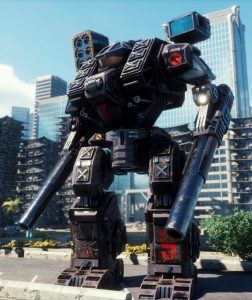6th Oriente Hussars
This article needs to be updated with material from Shattered Fortress. Once these titles clear the Moratorium period, or if they already have, please consider revisiting this article and updating it with the new material. |
Contents
History
Formation
Destroyed in 3015 while fighting Anton Marik's rebels, with the survivors absorbed into the Fusiliers of Oriente, and reformed in 3058.[1]
Several members of the Fusiliers of Oriente have suggested that the unit should be named the "Sixth Fusiliers of Oriente", which has annoyed the members of the Hussars. The LCCC has sided with the members of the Sixth, so the unit will remain the Sixth Oriente Hussars.
Anton's Revolt
As part of Janos Marik's strike force, the Sixth Oriente Hussars landed on Calloway VI. There they faced the Wolf's Dragoons Beta and Gamma regiments. Though they destroyed the Dragoons reputation for invincibility, the conflict essentially destroyed the Sixth as a unit.[2] The Sixth wouldn't re-form until 3058.
3058-3067
The Sixth spent most of its time on the Free Worlds/Magistracy of Canopus border hunting down pirates. This provided them with a great deal of practical experience that they lacked. Their success on these pirate-hunting trips earned them the nickname of the "Aardvarks".[3]
Jihad
During the chaos of the Jihad, the Sixth Oriente Hussars returned to the Duchy of Oriente and took up station on Dalton and Mansu-ri.[4]
By 3085 the Sixth had successfully defended the Nimakachi Fusion Products plant on Dalton from Word of Blake, Regulan, and pirate raids. During the time the Sixth has garrisoned Dalton, no enemy forces have been able to escape with product from that factory.[5]
Dark Age
Prior to Operation HOMECOMING the Sixth struck at the 15th Regulan Hussars.[6] During the Victoria War the Sixth and 1st Oriente Hussars fought the Red Lancers and Roman's Mounted Fusiliers on Ipswich.[7] The Sixth also fought the CCAF on Bentley.[8] In fact, Bentley was invaded by the Sixth, and they quickly took the world. However, after the conquest every member of the civilian government committed suicide rather than help the Free Worlds League, and this turned the rest of the population against the Sixth. Rumors of executions and secret prisons also increased the stress level. A month after they took Bentley, the Death Commandos and 2nd Capellan Defense Force landed to liberate the world. The Sixth was so stressed out by the civilian insurrection that they simply abandoned the world and relocated to Goodna.[9] The Sixth was pursued by the Second CDF and Death Commandos. The Commandos killed the Sixth's senior officer staff, and the Hussars were thrown into chaos, leaving Goodna and moving to Ipswitch, where they reinforced the 1st Oriente Hussars.[10] They faced Roman's Mounted Fusiliers and the Red Lancers, and fought the CCAF units to a standstill. The CCAF units eventually withdrew to Shuen Wan.[11]
The Sixth was responsible for guarding the narrow transport corridor between the two halves of the re-formed Free Worlds League. They weren't happy with this assignment, but after a few raids by the Regulan Hussars, the Sixth saw how important their posting was.[12] They were split into two commands and garrisoned both Alterf and Manhiki in 3145.[13]
Officers
| Rank | Name | Command | |
|---|---|---|---|
| Commanding Officers of the 6th Oriente Hussars | |||
| Colonel | Astoria Jaka | 3059 - 3085[1][14][15] | |
| Colonel | Howard Finley | 3145[13] | |
Tactics
In 3085, the Sixth Oriente Hussars' ground forces would gather around their DropShips or other strong points while their VTOLs and conventional aircraft performed reconnaissance. The Sixth then attacks their foe as quickly as they can.[5]
During the Victoria War they were specialists in assault tactics.[16]
Composition History
2765
Sixth Oriente Hussars (Regiment/Regular/Reliable)[17]
2786 - 2821
6th Oriente Hussars (Regiment/Regular/Reliable) [18]
- Note: At this point in time the assault-weight unit was stationed on Tintavel. In 2821 the command was reduced to 44 of its strength and was deployed at Sappho. [18]
2830
6th Oriente Hussars (Regiment/Regular/Reliable) [19]
- Note: At this point in time the assault-weight unit was stationed on Sappho with an operational readiness of 74 percent. [19] The unit was destroyed during the war.[19]
3059-3067
Sixth Oriente Hussars (1 Regiment/Green/Reliable)[1][14]
- CO/1st Battalion: Colonel Astoria Jaka
- XO: Force Commander Luis Brunnel
- 2nd Battalion: Force Commander Magda Ybarra
- 3rd Battalion: Force Commander Narcis Serra
Sixth Hussars Aerospace (1 Squadron/Regular/Reliable)[1][14]
- Wing Commander: Lieutenant Commander Alfredo Kraus
3085
Sixth Oriente Hussars (Green/Reliable)[15]
- CO: Colonel Astoria Jaka
Sixth Hussars Aerospace (Wing/Regular/Reliable)[15]
- CO: Commander Bharata Suess
3145
Sixth Oriente Hussars (2 Battalions/Veteran/Fanatical)[13]
- CO: Colonel Howard Finley
Sixth Hussars Aerospace Wing (Wing/Veteran/Reliable)[13]
- CO: Commander Geoffrey Bernard
Twenty-fourth Oriente Heavy Armor (Regiment/Regular/Fanatical)[13]
- CO: Lieutenant Colonel Alan Shelton
Third Salur Guard (Regiment/Veteran/Fanatical)[13]
- CO: Lieutenant Colonel Harlan Powell
References
- ↑ 1.0 1.1 1.2 1.3 Field Manual: Free Worlds League, p. 97, "6th Oriente Hussars Unit Profile"
- ↑ Historical: Brush Wars, p. 29
- ↑ Cite error: Invalid
<ref>tag; no text was provided for refs namedfmu152 - ↑ Field Report: FWLM, p. 10
- ↑ 5.0 5.1 Field Manual: 3085, p. 84
- ↑ Technical Readout: 3145 Free Worlds League, p. 42
- ↑ Technical Readout: 3145 Free Worlds League, p. 44
- ↑ Technical Readout: 3145 Free Worlds League, p. 48
- ↑ Historical: Wars of the Republic Era, pp. 57-58
- ↑ Historical: Wars of the Republic Era, p. 60
- ↑ Historical: Wars of the Republic Era, p. 61
- ↑ Field Manual: 3145, p. 104
- ↑ 13.0 13.1 13.2 13.3 13.4 13.5 Field Manual: 3145, p. 115, "Free Worlds League Military"
- ↑ 14.0 14.1 14.2 Field Manual: Updates, p. 161, "AFFS Deployment Table"
- ↑ 15.0 15.1 15.2 Field Manual: 3085, p. 92, "FWLM Deployment Table - 3085"
- ↑ Historical: Wars of the Republic Era, p. 99
- ↑ 17.0 17.1 Field Report 2765: FWLM, p. 14, "Oriente Hussars"
- ↑ 18.0 18.1 ’’ First Succession War’’, p. 138
- ↑ 19.0 19.1 19.2 ’’ Second Succession War’’, p. 98


